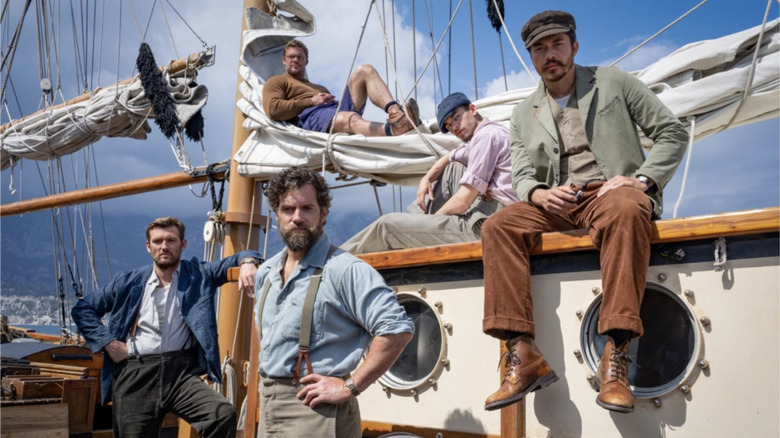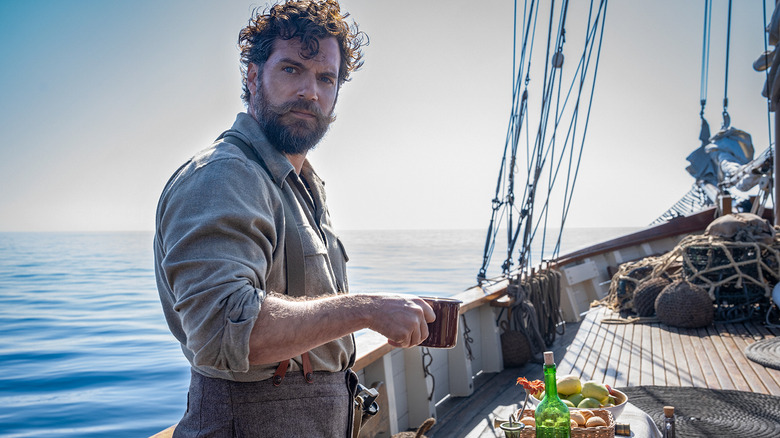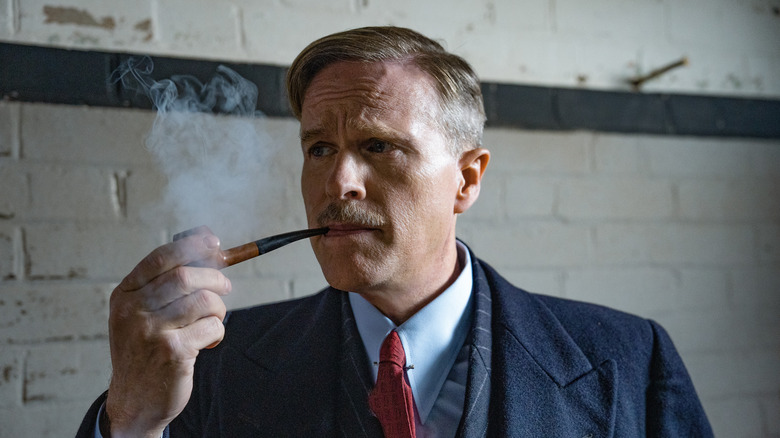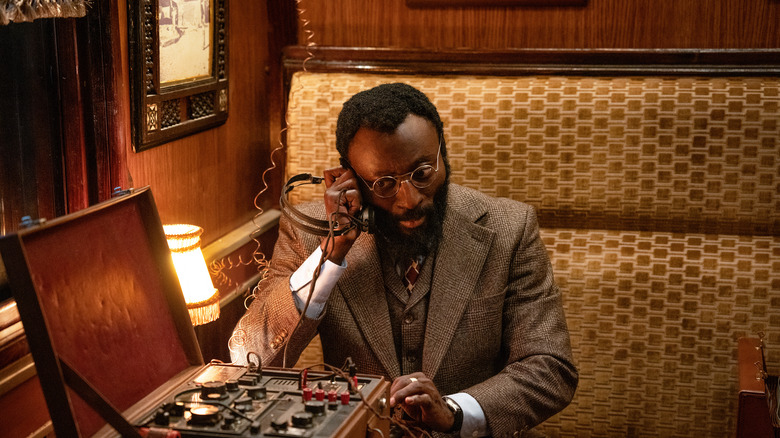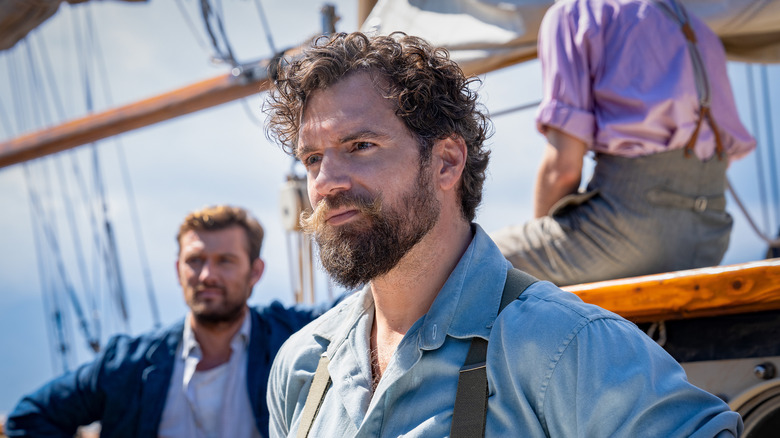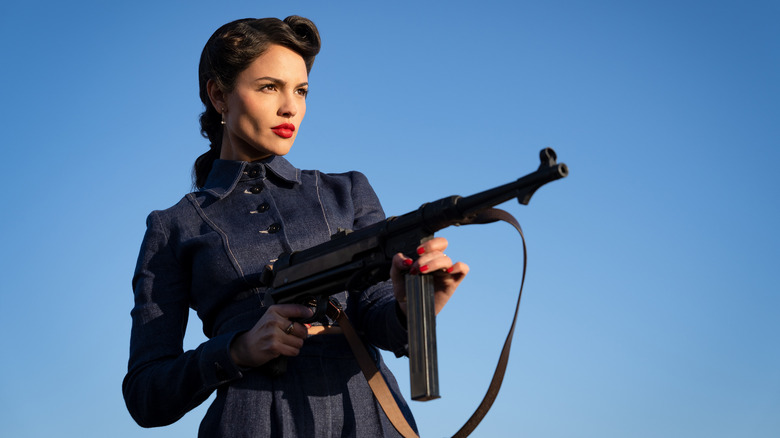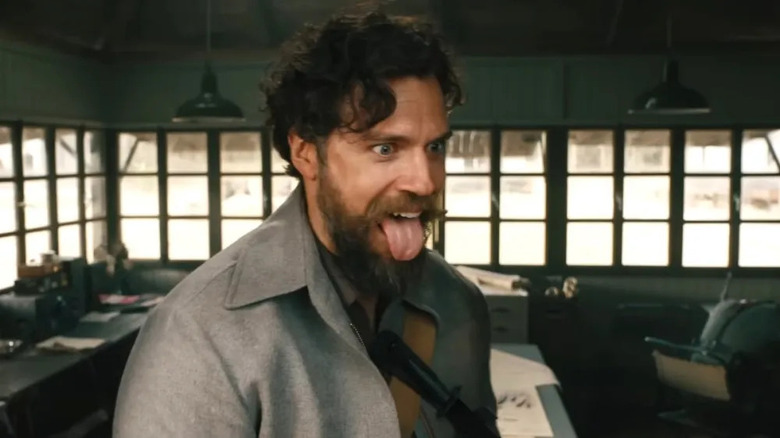The Ministry Of Ungentlemanly Warfare Ending Explained: Postmaster Generals
This article contains massive spoilers for "The Ministry of Ungentlemanly Warfare."
With hindsight being 20/20 and all, it's ironic that the cultural nickname for World War I was "The Great War," given the existence of World War II. While no war in history has ever been "great" in the truest sense of the word, WWII's seemingly evergreen impact on just about every aspect of modern life, not to mention art, makes it the clear cultural victor. To wit, not only are films, television shows, books, and other works related to that war being produced today, but they remain incredibly popular — after all, a WWII-set movie just won Best Picture at this year's Oscars.
What's perhaps extra wild is that not only is WWII-themed art still viable, but there are corners of the war's history that remain largely unexplored. One of these corners is Operation Postmaster, the British special operation undertaken on January 14, 1942, on the island of Fernando Po (now known as Bloko), which was then controlled by Spain. While not the flashiest or most notable operation of the war, Postmaster was nonetheless a key mission that had far-reaching repercussions; without it, the United States may not have been able to help England at a crucial point in the war.
The latest film from director and co-writer Guy Ritchie, "The Ministry of Ungentlemanly Warfare," details the people involved in Operation Postmaster and their efforts, though not in any dry historical drama fashion. As it indulges in Ritchie's stylized, hip aesthetic, the film also doubles as the third installment of the director's loosely-related '60s spy throwback trilogy, consisting of 2015's "The Man from U.N.C.L.E." and 2023's "Operation Fortune: Ruse de Guerre." Despite "U.N.C.L.E." being the only one of the three actually set in the 1960s, each film revitalizes an aspect of '60s spy cinema, and "Ungentlemanly Warfare" recalls movies like "The Dirty Dozen," "The Guns of Navarone," and "The Great Escape" in its tale of men (and a woman) on a mission behind Axis lines.
Epic Sail
"The Ministry of Ungentlemanly Warfare" establishes its tone right from the opening scene, a cold open that also helps explain the film's title and just why this real-life tale has been kept under wraps for this long. A sailboat headed in the direction of the coast of West Africa (where the island of Fernando Po is located) is waylaid by a German R boat. As the captain of that boat (Tim Seyfi) and his men inspect the smaller vessel, Gus March-Phillips (Henry Cavill) and Anders Lassen (Alan Ritchson) protest that they are merely a neutral fishing ship, and heavily imply that they're a homosexual couple to boot.
As the Nazi captain becomes increasingly aggrieved at both the lack of obvious enemy activity and the two men's heavy flirting, he decides to order his men to pour gasoline on the ship, indicating that the only way the crew can survive is by abandoning ship — and, even if they do, he'll have them shot if they reach the shore. Just then, one of the other Nazis happens upon Henry Hayes (Hero Fiennes Tiffin) hiding below decks, and the jig is up. Hayes, March-Phillips, and Lassen dispatch the Germans with a quickness, revealing that they're not only especially professional and deadly combatants, but they're British operatives as well.
It's this last point that the title "Ministry of Ungentlemanly Warfare" refers to. The movie is based on Damien Lewis' 2014 book "Churchill's Secret Warriors," which in turn recounted recently declassified files about Operation Postmaster and the informal forming of Britain's Special Air Service. The very clandestine operation and methodology therein went against England's historical attitudes toward "gentlemanly" warfare. As if to prove that point, when the other sailors wonder how they're to get away from the R boat off their bow, demolitions expert Freddy Alvarez (Henry Golding) arrives from underwater, revealing he's just wired the ship to explode, which it subsequently does. Not very gentlemanly of him, but bloody effective.
The talking stages
Flashing back to a few weeks earlier, it's revealed how March-Philips, Lassen, Hayes, and Alvarez's voyage got started. March-Phillips, who had been incarcerated at His Majesty's pleasure, was pulled out of confinement and brought before none other than Prime Minister Winston Churchill (Rory Kinnear) to be secretly given command of one branch of Operation Postmaster. March-Phillips was hand-picked for the job by Brigadier Gubbins (Cary Elwes), also known as "M," whom Churchill has made the head of Special Operations. M is assisted by Lieutenant Commander Ian Fleming (Freddie Fox); yes, the future creator of James Bond himself, who is about to find a lot of inspiration for his subsequent writing career in the men of Operation Postmaster.
As to the operation itself: it seems the Atlantic Ocean is plagued by the scourge of the German U-boats, preventing the United States from sending their ships over to England to provide supplies and other aid. British intelligence has uncovered where the U-boats get their supplies from: the Italian cruise ship the Duchessa, which is kept in Fernando Po's harbor. The plan has three prongs: one, for March-Phillips to lead a small team by sea on the trawler Maid Honour, sailing in secret to Fernando Po to blow up the Duchessa. Two, for former actress and singer Marjorie Stewart (Eiza González) and club owner Richard Heron (Babs Olusanmokun), who are also present at the briefing, to board a train where the plans for the Duchessa and its cargo manifest are being transported and obtain them for study. And three, for Stewart to use Heron's connections on Fernando Po to seduce and distract the Nazi commanding officer on the island.
March-Phillips inadvertently adds a fourth prong, however: in insisting that his old war buddy, Geoffrey Appleyard (Alex Pettyfer), be added to the team, he's informed that Appleyard has been captured by the Nazis and is being held in their prison camp in La Palma in the Canary Islands. Unfazed, March-Phillips observes that he and his men will simply have to break him out along the way. As if all of that weren't enough, the British Parliament cannot catch wind of any part of the operation; not only would the operatives be instantly arrested, but the operation itself would fail, meaning England might be doomed to fall to the invading German horde.
Arrangers on a train
As Prong One gets underway with March-Phillips and his motley crew headed out to sea, Stewart and Heron make their train. As the duo prepares to enact their first part of the plan, they have a friendly yet decidedly honest debate with each other about whether or not they're on the right team, based solely on what kind of food will become dominant should whichever side in the war win out.
Resigned to being okay with English fare for the time being, Stewart plays out a little melodrama in the dining car with a cadre of Nazi soldiers, a younger one drunkenly vying for her attention while an older General attempts to demonstrate German etiquette. It's all the distraction Marjorie needs to place her suitcase over the mark's luggage, bringing the plans for the Duchessa back to a secret cabin and transmitting the information back to SAS HQ. Being so steeped in the midst of the war, however, HQ is a little haphazardly run, allowing a non-SAS officer (Russell Balogh) to catch wind of the clandestine operation.
After Stewart and Heron arrive in Fernando Po, Heron, in his guise as a club owner on the island, introduces Stewart to Heinrich Luhr (Til Schweiger), informing the woman that "The only thing worse than a Nazi is him." Stewart pretends to be a gold trader looking to strike a deal with Luhr, and plays things close to her chest, at one point confessing her true identity as a Jewish woman with a deep hatred for the Nazis right to his face before playing it off as a joke. Despite Stewart's confidence in wrapping Luhr around her finger, Heron's warning isn't idle; while passing a room Luhr had recently left, Stewart sees the body of a nude woman strung up, having clearly been abused in various ways by the Nazi sadist.
Timing is everything
Meanwhile, the boys on the boat have left behind the exploded Nazi R-ship and made their way to La Palma where Appleyard is being held. Despite a proper incursion plan by March-Phillipps, Lassen decides the direct approach is the best approach, leading the four men into the prison camp as they brutally and rapidly dispatch the entirety of the Nazi presence there. Despite that rather ungentlemanly behavior, Appleyard patiently waits until his compatriots are finished before asking to be unhooked from the torture device he's attached to.
Once back aboard the Maid Honour, the boys are dismayed at learning that, based on Stewart and Heron's findings, the Duchessa is due to leave Fernando Po earlier than expected, meaning they now have to make it to the island within three days. Hayes begrudgingly agrees to speed up their trip, warning that it will mean they will likely be spotted by another British vessel along the way. Sure enough, they are, and before the men can be arrested by the HMS Violet for being part of an illegally sanctioned operation, a U-boat attacks the British battleship, allowing the Honour to continue its mission.
Back on Fernando Po, Stewart and Heron find themselves enlisting the services of a local pirate, Kambili Kalu (Danny Sapani), who commands a small army that can help the Maid Honour boys plant the charges on the Duchessa. Once the Honour arrives at Fernando Po, the full group of SAS-backed saboteurs confer with their plan for the evening: as the Nazi officers will be having a masquerade party at one venue while the enlisted men will be boozing it up at another, Heron will cut the power to the shoreline while Stewart distracts Luhr, allowing the boat boys and the pirates to blow up and sink the Duchessa.
Party time
Unfortunately, the best-laid plans tend to run into unforeseen complications. Luhr, who is already suspicious of Stewart, initially insists that the two of them attend a secret "dark Nazi party" instead of the masquerade ball, but Stewart is able to convince him to attend the ball anyway, thanks in part to her Cleopatra costume (which means she's able to get the clueless Nazi to dress himself up like Caesar). Meanwhile, Heron sets the charges at the local power plant but is nearly stopped by a small Nazi patrol; fortunately, he takes out his would-be killers before they take him out.
Once the party begins, Stewart and Heron are shocked to discover through errant gossip that the Duchessa has very recently been retrofitted with armored plating, meaning it's now impossible to sink. Knowing that the explosive charges will have no effect, Heron rushes to the harbor to warn the men, telling them that the charge he'd set to cut the power cannot be stopped in time, so there's no easy scrubbing of the mission to consider.
March-Phillips and Kalu concoct an improvised and daring plan B: instead of blowing up or sinking the Duchessa, they'll steal it. This means taking over some nearby tugging vessels that they can then use to pull the Duchessa out to sea, a task that the rest of the men are eager to attempt. In order to keep the Nazi soldiers away, Heron will simply lock the men inside the warehouse where they're partying.
As far as the masquerade party and Luhr goes, Stewart prepares a special "surprise" for her Nazi date: a fully-fledged performance of Kurt Weill and Bertolt Brecht's "Mack the Knife," made famous by 1928's "The Threepenny Opera." While Stewart's sexy performance is suitably distracting, she makes a very "Inglourious Basterds"-esque slip up, pronouncing a certain word with a Yiddish instead of a German inflection, causing Luhr's suspicions about the woman to finally be confirmed.
Stealing some ship
Just as all of these things are getting underway, the entire operation is thrown into jeopardy as the soldier in SAS who'd reported some clandestine goings-on earlier is revealed to now be working as a mole for the British government, and March-Phillips is officially ordered to stand down. With all the men choosing to disobey orders and continue the mission, the boys take over the surrounding tugboats, dispatching the crews while hooking up each boat to the Duchessa.
Although Luhr takes Stewart to that "dark Nazi party" he'd promised her earlier, indicating that she's to be strung up in the same manner she'd seen the earlier woman suffer, the chaos that ensues on the harbor once the enlisted Nazis realize they've been locked inside their party and are now fighting their way out distracts Luhr, who goes off to investigate, allowing Stewart to make her own escape.
Since the men end up having to use explosive charges to blow the anchor chains off the ships, the entire town ends up being alerted to the escape attempt-cum-theft, making what was once a clandestine operation an all-but-public skirmish. Nonetheless, the spies and pirates are successful in their mission, and before Luhr can bring the brunt of his fury down on any of them, he's shot dead by an escaping Stewart, meaning another "Caesar" has been assassinated yet again.
Zeroes to heroes
The escaping new crew of the Duchessa sail out to meet the waiting HMS Violet, whereupon the vessel is surrendered into British custody and the spies are ordered to surrender themselves as well. Fortunately, the pirates make their getaway, as Kalu and March-Phillips bid each other a fond farewell. Despite being caught red-handed giving the green light to an illegal operation, Churchill and M's efforts have ultimately been successful, stopping the U-boat scourge and allowing the US to send support ships to England, meaning that they barely escape being reprimanded or worse.
Not so lucky are the operatives themselves, who have been thrown in jail for their heroics. Yet all is not lost or forgotten: one day soon after the dust has settled, the full complement of spies are brought into a room in the prison where they're met by M, Fleming, and Churchill himself. When asked what will be done with them, the Prime Minister simply responds: "From now on, they work for me." With that, a series of coverings is removed from a table set in front of the prisoners, revealing a banquet fit for a king. March-Phillips eyes his compatriots, seeing if they're ready to partake in such a feast in a manner most unbecoming of him; that is to say, gentlemanly.
As a series of epilogue title cards reveal the rest of each spy's history subsequent to Operation Postmaster, it's clear how much influence these real-life figures had on not just the actual war and history, but on pop culture as well. It's in large part because of them that the entire subgenre of spy fiction, particularly in England, became so fashionable about a decade and change following WWII. Through that, we can see how the gentleman (or ungentlemanly) spy led to the rogue cop, the modern-day action hero, and beyond. And to think, all it took was a huge dash of courage and a little shifting of their manners aside. Even the most prim and proper person certainly can't argue with results like that.
